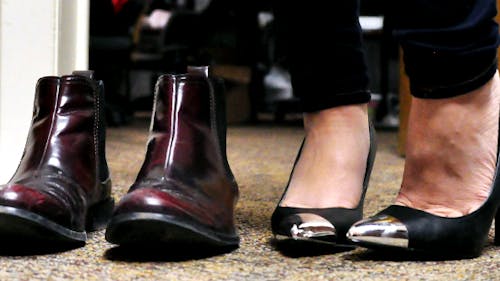Rutgers professor finds gender inequality prevalent in field of political science

Even though women are more likely to complete an undergraduate degree and also enroll in graduate studies, one Rutgers–Camden professor is raising concerns about the field of political science remaining dominated by men.
Shauna Shames, an assistant professor in the Rutgers–Camden Department of Political Science, is making claims that the social science is not inclusive toward women, in her recent article, “Political Science’s Gender Problem."
The main concern of the article is that women are viewed as the minority in certain sub-fields of political science, Shames said.
“I hope that in the future, women will feel more comfortable in the four major sub-fields of political science,” she said. “(The four are) American politics, political theory, comparative government and international relations.”
In addition to a low female presence in the four major sub-fields, an uneven distribution is present in an emerging fifth sub-field known as political methodology, she said.
Shames said she fears women feel unwanted in sub-fields comprised primarily of men.
“It’s a bad feeling to feel like you’re a very visible minority,” she said. “You feel like an outsider.”
The fact that many women have to care for family members might be attributed to this trend, said Lisa Miller, an associate professor in the Rutgers–New Brunswick Department of Political Science.
Another possible explanation for the disparity could be that professors are trying to gain tenure while also caring for their family, she said.
“I have been a minority in many ways in my career,” she said. “One of the big issues in academia for women is families, if you’re trying to get tenure.”
Earlier in her career at another university, Miller had two young children and had to put her pursuit of tenure on hold, she said.
“It was hard to do without looking like you were asking for something,” she said.
Most political science jobs are now beginning to encourage women and minorities to apply, Shames said.
While this change is gradual, her fear is particularly over the focus on high-level statistics, she said.
Quantitative research methods have become more prestigious, and tend to be male-dominated, she said.
“I’m a little unusual,” she said. “Maybe they bucked the system hiring me.”
Quantitative research emphasizes objective measurements and statistical analysis of data collected through polls, questionnaires and surveys, Shames said.
Women have higher numbers across the board in political science sub-fields in terms of qualitative research, she said.
Qualitative research is credible in the same way that quantitative research is, Miller said.
Utilizing numerical or statistical comparisons poses the risk of undermining more suitable methods of analysis, she said.
“Qualitative methods are in fact methods, equal to quantitative ones,” she said. “There are a lot of tools for statistical analysis, but it runs the risk of undermining other legitimate and rigorous forms of social analysis.”
A focus on quantitative methods of research recently became a growing trend in political science, said R. Daniel Kelemen, a professor in the Department of Political Science.
This is because of political scientists who aspire to convince others that their specialty is a more technical subject, Ross Baker, a distinguished professor in the Department of Political Science, said.
“Political science has always aspired to live up to its name –– it’s a science,” he said.
There has been backlash regarding the exclusive focus on quantitative research in political science, Baker said.
“I think it’s got to be a mix,” he said. “There are qualitative pieces that help with understanding and they are more explanatory.”
The rise in quantitative research methods grew more prevalent during the past few decades, Kelemen said.
Even though it is still possible to be recognized for qualitative research, it is more difficult to do so when compared to quantifiable data analysis, he said.
“You can still get published in the top journals with qualitative research, but the hurdle is much higher now,” Kelemen said.
In the future, Shames said she hopes political methodology will invite women into positions of leadership.
“I just want anybody, regardless of their gender, to feel comfortable in all subfields (of political science),” she said.



